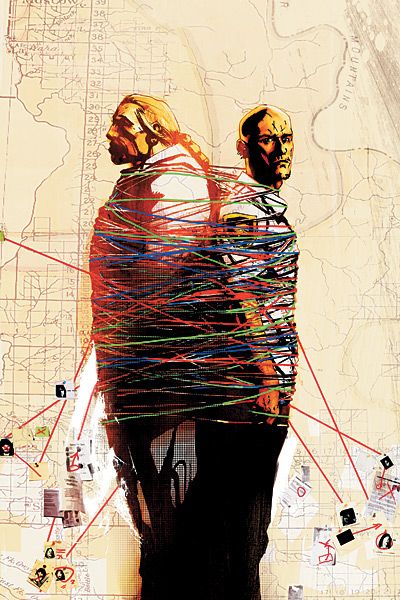"Scalped" is the best Vertigo comic in recent memory. While "DMZ" alternately stumbles and sprints in a vague, uncertain direction, and "Fables" binds itself in its all-to-clever conceit, "Scalped" explores one of the essential human dilemmas: how does one do what is right and just in an unjust world?
This comic isn't a philosophical treatise on the subject, but that eternal question underlies the suffering and pain of the world in and around "the rez." Basically, "Scalped" is a hard-hitting crime comic, the story of a bitter and angry tribal police officer, Dashiell Bad Horse, who is secretly working for the FBI in an attempt to bring down the corrupt Chief of the Oglala tribe, Lincoln Red Crow.
What makes this comic so good is that writer Jason Aaron avoids most of the usual American Indian cliches and expected sentimentality generally seen in stories set on reservations. Even the mysticism that appears in earlier issues isn't used gratuitously as an explanation of "forces beyond our knowledge," but rather as an expression of culture and perspective. Bad Horse himself speaks on behalf of the skeptical reader when he dismisses Indian superstitions and traditions with frustration and anger. He has no time for such antiquated notions. But Aaron uses his disrespectful comments to show the protagonist's closed-mindedness, and in this current arc, "Dead Mothers," Bad Horse begins to realize the power in these old traditions and what they represent. He's growing as a character, as a man, and that growth only adds to the depth of his conflict with Red Crow and the reservation itself.
"Scalped" #16 is part four of the five-part "Dead Mothers" arc, and the title clearly defines the topic at hand. Bad Horse's mother, Gina, lies dead, and because of his bitterness about the past, he has no desire for revenge. He doesn't even want to investigate the death. He knows Red Crow was involved, but he doesn't plan on doing anything about it. Instead, he focuses his attention on another murder -- another dead mother -- and the young son left behind. Bad Horse is clearly trying to make amends with his past through this youthful surrogate. Like him, the boy is angry and resentful, but Bad Horse sees the boy as a chance to redeem himself. If he can help the boy, it's like being able to travel back into the past and give himself a shot at happiness.
In issue #16 we see the reality beneath that illusion as the boy trades Bad Horse's arrowhead collection -- a symbolic token given to the boy -- in exchange for a gun. While Bad Horse may not want to avenge Gina's death, the boy wants to avenge his mother's death, and he plans on doing whatever it takes to achieve justice.
"Scalped" #16 also introduces a new character, Sheriff Wooster Karnow. Karnow's all arrogance and verbosity, and as R. M. Guera's moody panels are crowded out by word balloons we are reminded just how subtle and understated this comic usually is. Karnow literally fills his physical space with words, imposing his version of reality on all others in his vicinity. Bad Horse, with his simple and direct statements, punctures Karnow's bluster and walks away in silence. It's a visually powerful moment that shows a victorious Bad Horse walking away with his head down because he knows that his verbal victory will cost him in the future. Karnow certainly won't forget the humiliation.
When Vertigo began advertising itself as the "HBO of comics," this must have been the series they had in mind. It's the best of the current crop, by far, and "Scalped" #16 is just another reason why.

